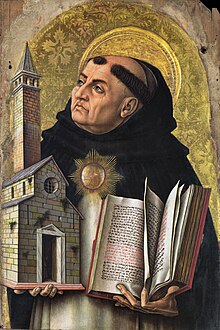Thomas Aquinas OP (/əˈkwaɪnəs/ ə-KWY-nəs; Italian: Tommaso d'Aquino, lit. 'Thomas of Aquino'; c. 1225 – 7 March 1274) was an Italian[6] Dominican friar and priest, the foremost Scholastic thinker,[7] as well one of the most influential philosophers and theologians in the Western tradition.[8] He was from the county of Aquino in the Kingdom of Sicily.
Thomas was a proponent of natural theology and the father of a school of thought (encompassing both theology and philosophy) known as Thomism. Central to his thought was the doctrine of natural law, which he argued was accessible to human reason and grounded in the very nature of human beings, providing a basis for understanding individual rights and moral duties.[9] He argued that God is the source of the light of natural reason and the light of faith.[10] He embraced[11] several ideas put forward by Aristotle and attempted to synthesize Aristotelian philosophy with the principles of Christianity.[12] Aquinas' natural law theory has been influential in shaping ideas about human liberty and the moral limits of government authority.[13][14] He has been described as "the most influential thinker of the medieval period"[15] and "the greatest of the medieval philosopher-theologians".[16]
Thomas's best-known works are the unfinished Summa Theologica, or Summa Theologiae (1265–1274), the Disputed Questions on Truth (1256–1259) and the Summa contra Gentiles (1259–1265). His commentaries on Christian Scripture and on Aristotle also form an important part of his body of work. He is also notable for his Eucharistic hymns, which form a part of the Church's liturgy.[17]
As a Doctor of the Church, Thomas Aquinas is considered one of the Catholic Church's greatest theologians and philosophers.[18] He is known in Catholic theology as the Doctor Angelicus ("Angelic Doctor", with the title "doctor" meaning "teacher"), and the Doctor Communis ("Universal Doctor").[a] In 1999, John Paul II added a new title to these traditional ones: Doctor Humanitatis ("Doctor of Humanity/Humaneness").[19]
- ^ Cite error: The named reference
diobethwas invoked but never defined (see the help page). - ^ Cite error: The named reference
resurrectionpeople.orgwas invoked but never defined (see the help page). - ^ Cite error: The named reference
catholicsaints.infowas invoked but never defined (see the help page). - ^ Maritain, Jacques (2005). An Introduction to Philosophy. Translated by Watkin, E. I. Lanham, Maryland: Rowman & Littlefield Publishers, Inc. p. 112. ISBN 9781461667377.
- ^ Cite error: The named reference
SEPwas invoked but never defined (see the help page). - ^ Conway 1911; Vaughan 1871.
- ^ "Thomas Aquinas". Encyclopedia Britannica. Retrieved 9 October 2024.
Thomas Aquinas... was an Italian Dominican theologian, the foremost medieval Scholastic.
- ^ "Thomas Aquinas (1224/6–1274)". Internet Encyclopedia of Philosophy. Retrieved 10 October 2024.
However, it also seems right to say—if only from the sheer influence of his work on countless philosophers and intellectuals in every century since the 13th, as well as on persons in countries as culturally diverse as Argentina, Canada, England, France, Germany, India, Italy, Japan, Poland, Spain, and the United States—that, globally, Thomas is one of the 10 most influential philosophers in the Western philosophical tradition.
- ^ Finnis, John (1998). Aquinas: Moral, Political, and Legal Theory. Oxford University Press. ISBN 978-0198780854.
- ^ "Thomas Aquinas, Commentary on the De Trinitate of Boethius, quest. 2, art. 3". Archived from the original on 18 September 2021. Retrieved 22 February 2021.
- ^ Cite error: The named reference
SEP3was invoked but never defined (see the help page). - ^ Blair, Peter. "Reason and Faith: The Thought of Thomas Aquinas". The Dartmouth Apologia. Archived from the original on 13 September 2013. Retrieved 18 December 2013.
- ^ McInerny, Ralph (1992). Aquinas on Human Action: A Theory of Practice. Catholic University of America Press. ISBN 978-0813207491.
{{cite book}}: Check|isbn=value: checksum (help) - ^ Schall, James V. (1996). Thomas Aquinas: Scholar, Theologian, and Political Thinker. Rowman & Littlefield Publishers. ISBN 978-0847681903.
{{cite book}}: Check|isbn=value: checksum (help) - ^ Wippel, John F. (1995) 2nd ed., "Aquinas, Saint Thomas", The Cambridge Dictionary of Philosophy, Cambridge University Press. p. 36.
- ^ Broadie, Alexander (1999). "Aquinas, St Thomas", The Oxford Companion to Philosophy, Oxford University Press, p. 43.
- ^ "St. Thomas Aquinas | Biography, Philosophy, & Facts". Encyclopædia Britannica. Retrieved 20 January 2020.
- ^ Aquinas, Thomas (1993). Selected Philosophical Writings. Oxford University Press. pp. Xi. ISBN 0-19-283585-8.
- ^ "Inter Munera Academiarum (January 28, 1999) | John Paul II". www.vatican.va.
Cite error: There are <ref group=lower-alpha> tags or {{efn}} templates on this page, but the references will not show without a {{reflist|group=lower-alpha}} template or {{notelist}} template (see the help page).
